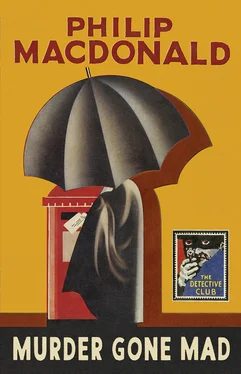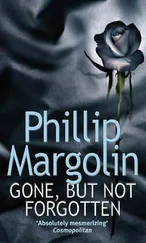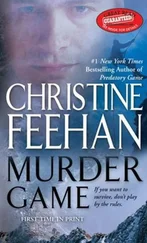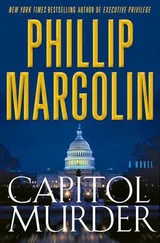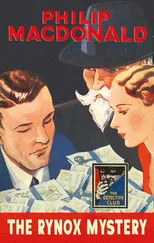There was a hard, black frost. After the warmth of the little parlour, the cold air outside caught at their breath. They both coughed.
‘A snorter of a night!’ said Mr Colby.
‘It is,’ agreed Mr Harvey, ‘that!’
They turned left out of the little red door. They turned up the path to the narrow passage which joins The Keep to Heathcote Rise. Out of the passage Mr Colby turned to his right.
‘The Trumpington Hall,’ said Mr Colby, ‘is just up here. Matter of three or four hundred yards.’
‘Ah!’ said Mr Harvey. ‘Quite.’
They did not get so far as the Trumpington Hall. There are two street lamps in the quarter mile length of Heathcote Rise. The first was behind Mr Colby and Mr Harvey as they left the mouth of The Keep. The second was about two hundred yards from the mouth of The Keep. They were walking upon the raised side path and as they came abreast this lamp, Mr Colby, as seemed his habit when passing street lamps, paused to take out the great silver watch. Mr Harvey, halting too, happened to glance over Mr Colby’s plump shoulder and down into the road.
‘My— God !’ said Mr Harvey.
‘What’s that!’ said his companion sharply. ‘What’s that!’
But Mr Harvey was gone. With an agility which would at any other time have been impossible to him, he had dropped down into the road and was now half-way out into the broad thoroughfare. Mr Colby, despite the cold, bony fingers of fear clutching at his vitals, scrambled after.
Mr Harvey was on his knees in the middle of the road, but he was within the soft, yellow radiance cast by the lamp. He was bending over something.
Mr Colby came trotting. Mr Colby halted by Mr Harvey’s shoulder.
Mr Harvey looked up sharply. ‘Get away!’ he said. ‘Get away!’
But Mr Colby did not get away. He was standing like a little, plump statue staring down at the thing beside which Mr Harvey knelt.
‘ Oh! ’ said Mr Colby in a whisper which seemed torn from him. And then again: ‘ Oh! ’
What he looked at—what Mr Harvey was looking at—was Lionel.
And Lionel lay an odd, twisted, sturdy little heap on the black road and where Lionel’s waistcoat should have been was something else. Mr Harvey picked up one of Lionel’s hands. It was cold like the road upon which it was lying.
THE next day—Saturday—was a windless day of hard frost and bright sunshine. The sort of day, in fact, which had been used to fill the placid heart of Mr Colby with boyish joy. But now Mr Colby’s heart was black.
Mr Colby sat, a huddled and shrunken little figure, at the table in his tiny dining-room. The chair upon the other side of the table was occupied by Miss Ursula Finch, the editor and owner of the Holmdale Clarion . Miss Finch was small and neat and brisk. Miss Finch’s age might have been thirty-three but probably was ten years more than this. Miss Finch was severely smart in a tweedy-well-tailored manner. Miss Finch’s pencil was busy among the rustling pages of her notebook, for Miss Finch was her own star reporter. But the eager, piquant face of Miss Finch was clouded with most unbusinesslike sympathy. And although her questions rattled on and on and her pencil flew, the eyes of Miss Finch were suspiciously bright.
It seemed suddenly to Mr Colby that he could not stand any more. Miss Finch had asked him a question. He did not answer it. He sat staring across the little room at the yellow distempered wall. First, all those policemen asking questions. What time did he leave? What time did you expect him back? Where was he going? What was he doing? Why was he doing it? What time did you start to look for him? Did anyone go with you to look for him? Where did you find him? How did you find him? Do you know anyone who bears enmity against yourself or him? If so, why? If not, why not? How? Who? Where? What? When? And now, this woman—although she was nicer than the policemen—now this woman, asking her questions. The same questions really, only put differently and more, as a man might say, intimate …
Mr Colby thought of the bedroom immediately above this room where he sat; the bedroom where, on the double bed, Mrs Colby lay a huddled and vacantly staring heap …
Mr Colby got to his feet. His chair slid back along the boards with a grating clatter. He said:
‘I’m sorry, miss. I can’t tell you any more. I want—I want—’ Mr Colby shut his mouth suddenly. He sat down again with something of a bump and remained sitting, his folded hands squeezed between his knees. He looked at the floor.
Miss Finch shut her note-book with a decisive snap and put round it its elastic band. She rose from her chair. Automatically Mr Colby, a well-mannered little person, got to his feet. Miss Finch came round the table in an impulsive rush. ‘I ought,’ said Miss Finch, ‘to have something awful done to me for worrying you, Mr Colby, upon such a dreadful day as this must be for you. But I would like you to understand, Mr Colby, that however much of a ghoulish nuisance I may seem, I may really be doing something to help. It may not seem like that to you at the moment. But it really is. You see, Mr Colby, nowadays the Press, by throwing what you might call a public light on things, helps authorities to … to … to find the monsters responsible for—’
‘Oh, please !’ said Mr Colby, holding out his hand as if to protect himself from a blow.
Miss Finch, with an impulsive gesture, seized the hand in both of hers and pressed it. ‘You poor man!’ she said.
Mr Colby withdrew his hand. Mr Colby opened the door for Miss Finch. In the hall Miss Finch halted and collected her stubby umbrella and tucked it martially beneath her left arm. She said:
‘If there is anything I can do for you or Mrs Colby—in a purely private capacity, I mean, Mr Colby—I do hope you will let me know … You wouldn’t like me, I suppose, to run up and sit with Mrs Colby for a little while? It would only be a little, because I’m so busy …’
Mr Colby shook his head dumbly. He opened the street door and shut it, a second later, upon the well-tailored back of Miss Finch. He wandered back to his dining-room and sat down once more at his dining-table and sighed and swallowed very hard and put his head in his hands.
‘Do they,’ asked Sir Montague Flushing of his manservant, ‘insist upon seeing me personally?’
Spender bowed gravely. ‘Yes, sir.’
‘And you have put them in …?’ said Sir Montague.
‘In the library, sir.’
Sir Montague blew out his cheeks and frowned. Sir Montague paced up and down the carpet. He said at last, half to himself:
‘These newspaper men are a public nuisance!’
‘Should I, sir,’ suggested Spender, ‘tell them that you are too busy to see them?’
‘No,’ said Sir Montague. ‘No. No. No. I suppose I must see ’em. What papers did you say they came from?’
‘One of the—er—gentlemen, sir,’ said Spender, ‘stated that he represented The Evening Mercury . The other was from The Wire .
‘I see. I see,’ said Sir Montague.
(Extract from The Evening Mercury , dated Saturday,
24th November.)
THE HOLMDALE MURDER
etc., etc.
(From our Special Correspondent.)
Holmdale, Saturday
Stranger and stranger grows the mystery of the murdered schoolboy, whose body was found at ten o’clock last night in the middle of a peaceful roadway in Holmdale Garden City. The problem that faces the police is no small one. The boy—Lionel Frederick Colby, of 4 The Keep, Holmdale—had left home at about 7.30 p.m. to visit the Boys’ Club, whose meetings are held in the Trumpington Hall. He had been in good spirits when he left home and had arrived at twenty-five minutes to eight at the Boys’ Club. Here he had spent the evening in the usual way, and had notably distinguished himself in the boxing competition which was held that night. He left the Hall with a number of companions when the Club meeting closed at 9.20. Half-way back towards his home—The Keep, which is off Heathcote Rise, is not more than five or six minutes’ walk from the Hall—Lionel remembered, according to two of his friends who have been interviewed by the Police, that he had left his gymnasium shoes and sweater behind. His companions had tried to dissuade him from going back, telling him that he would not find the place open. Lionel, who was a boy of great determination, stated that he had promised his mother not to forget the sweater as she wanted to wash it the next day. One of the boys, Charles Coburn (13) of 28 Lochers Avenue, Holmdale, stated to the police that he remembered Lionel saying that he would be able to climb in at a window. He left Coburn and the other boys in the middle of Heathcote Rise at approximately 9.25. At about a quarter past ten, Mr Colby, the boy’s father, together with a guest (Mr Harvey) went out to see whether they could find Lionel. They walked down Heathcote Rise towards Trumpington Hall, but half-way on this journey—beside a street lamp—they made the appalling discovery.
Читать дальше
